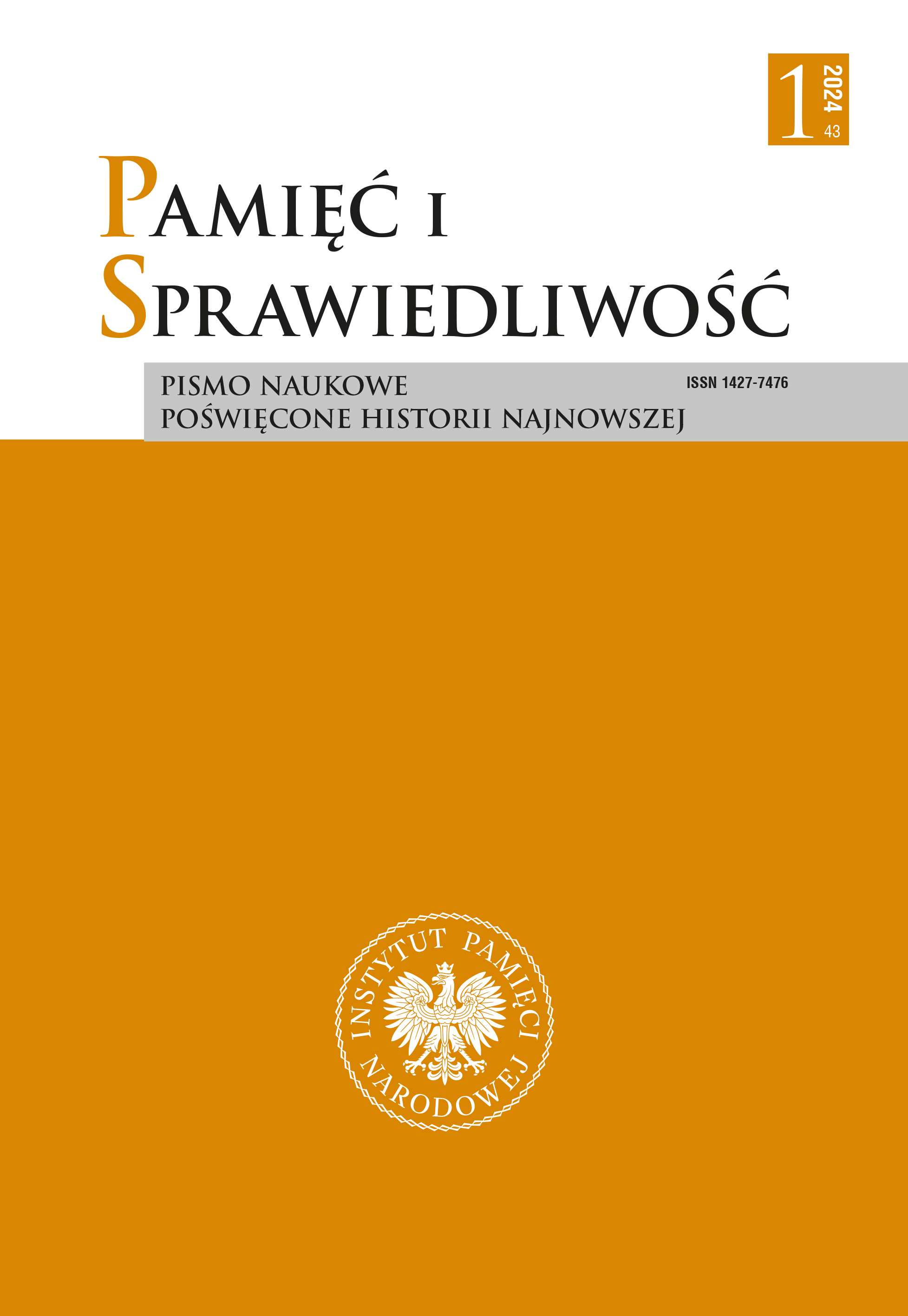Staff of the Prosecutor’s Office, Courts and the Advocacy in the Opole Voivodeship at the Beginning of Martial Law. Political Verification, Acts of Protest and Repressive Actions of the Communist Authorities
Remembrance and Justice, Vol. 43 No. 1 (2024), pages: 86-100
Publication date: 2024-08-09
 https://doi.org/10.48261/PIS244305
https://doi.org/10.48261/PIS244305
Abstract
At the beginning of martial law, the authorities of the Polish People’s Republic carried out political verification of justice employees in the Opole Voivodeship. Judges belonging to Solidarity were forced to leave the union. One of the judges was removed from the position of head of the provincial study for trainees. No verification interviews were conducted with advocates, however, it was intended to conduct ongoing political verification when recruiting applicants. Political verification of prosecutor’s office employees was essentially abandoned. The only thing left to do was to conduct explanatory interviews with some people. As a result, one person was dismissed from work. However, it turned out that the communist authorities did not fully control the situation in this environment. In December 1981, twelve current and former employees of the prosecutor’s office submitted their communist party (PZPR) ID cards. The PZPR authorities reacted with party penalties. Initially, all twelve were disciplinary expulsed from the party. Later, the punishment was slightly softened and in five cases they were simply removed from the list of the PZPR members. Subsequently seven people expelled from the communist party were dismissed from their jobs at the prosecutor’s office.
Keywords
stan wojenny • prokuratura • sądownictwo • weryfikacja polityczna • akty protestu • Opole Martial Law • prosecutor’s office • judiciary • political verification • acts of protest • Opole
References
Archiwum Państwowe w Opolu, Akta Komitetu Wojewódzkiego PZPR w Opolu.
Oddziałowe Archiwum Instytutu Pamięci Narodowej we Wrocławiu, 012/3196, t. 7; 121/25, t. 1; 122/435, t. 2.
Zbiory prywatne autora, Relacja ustna Józefa Niekrawca z 17 II 2005 r.
„Dziennik Zachodni” (wydanie internetowe) 2018.
„Nowa Trybuna Opolska” (wydanie internetowe) 2007.
„Trybuna Opolska” 1990.
Bereszyński Z., Jan Piątkowski (1935–2016) [w:] Słownik biograficzny polskiego katolicyzmu społecznego, t. 6, red. R. Łatka, Warszawa 2023.
Bereszyński Z., NSZZ „Solidarność” i rewolucja solidarnościowa na Śląsku Opolskim 1980–1990, Opole 2014.
Bereszyński Z., Rewolucja „Solidarności” w województwie opolskim 1980–1990. Historia ilustrowana regionu w czasach przełomu, wyd. 2, Opole 2021.
Bereszyński Z., Usłużni, zastraszeni, niepokorni. Postawy sędziów i innych pracowników wymiaru sprawiedliwości wobec systemu komunistycznego na przykładzie Śląska Opolskiego [w:] Zbrodnie sądowe w latach 1944–1989. Konformizm czy relatywizm moralny środowisk prawniczych?, red. M. Grosicka, D. Palacz, Kielce–Warszawa 2020.
Janik J., Senft S., Zamelski P., Sądownictwo na Śląsku Opolskim [w:] Środowisko prawnicze Opola i województwa opolskiego, red. nauk. S.L. Stadniczeńko, H. Jamry, P. Zamelski, Opole 2019.
Paczkowski A., Wojna polsko-jaruzelska. Stan wojenny w Polsce 13 XII 1981 – 22 VII 1983, Warszawa 2006.
Roszkowski W., Najnowsza historia Polski 1980–2006, Warszawa 2007.
Sowa A.L., Historia polityczna Polski 1944–1991, Kraków 2011.
Sędzia Sądu Najwyższego Tadeusz Domińczyk, https://www.sn.pl/promemoria/osoby/SitePages/
tDominczyk.aspx (dostęp 27 lutego 2024 r.).
License
Copyright (c) 2024 Remembrance and Justice

This work is licensed under a Creative Commons Attribution-NonCommercial-NoDerivatives 4.0 International License.
https://creativecommons.org/licenses/by-nc-nd/4.0
Most read articles by the same author(s)
- Zbigniew Bereszyński, Colloquium Opole 2021. Wspólny mit czy źródło sporu politycznego? Dziedzictwo opozycji antykomunistycznej z trójstronnej polsko-czesko-niemieckiej perspektywy [Colloquium Opole 2021. Common Myth or Source of the Political Dispute? The Heritage of the Anti , Remembrance and Justice: Vol. 41 No. 1 (2023)
- Zbigniew Bereszyński, The ‘Solidarity’ Revolution in the Capital of Polish Music (1980–1989). Attitudes and the Social role of Artists during Historical Turning Points, with Opole as an Example , Remembrance and Justice: Vol. 24 No. 2 (2014)
- Zbigniew Bereszyński, SB files do not lie, but they can be misleading. Conclusions from the analysis of documentation on the SB human intelligence sources , Remembrance and Justice: Vol. 20 No. 2 (2012)
 Język Polski
Język Polski
 English
English
 Deutsch
Deutsch
 Français (France)
Français (France)
 Italiano
Italiano
 Русский
Русский



 PDF (Język Polski)
PDF (Język Polski)




